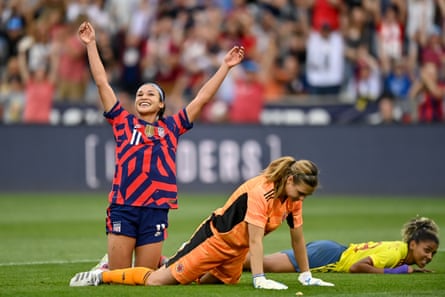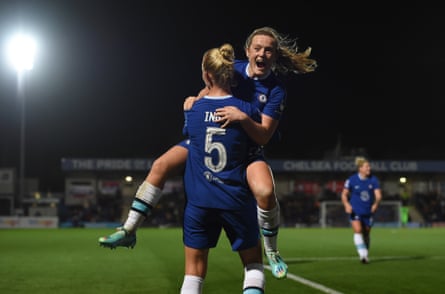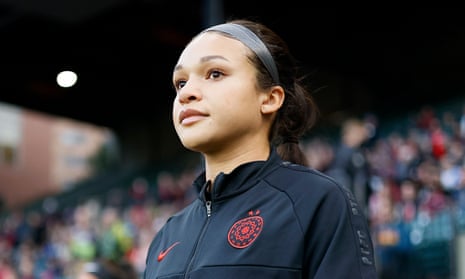Welcome to Moving the Goalposts, the Guardian’s free women’s football newsletter. Here’s an extract from this week’s edition. To receive the full version once a week, just pop your email in below:
In October Sophia Smith sat in front of the gathered media in Washington DC and calmly outlined her ambition: to become the best player in the world. It is quite a claim but then she had already had a pretty good year: She was the 2022 NWSL MVP (the youngest ever), was awarded the same accolade for the season’s final, which her club Portland Thorns won, and scored in the final.
The goal – in the fourth minute – was celebrated with a shrug, which went viral. What was it for? The critics. Smith said there had been people who didn’t feel she deserved being the league MVP. She added: “And that’s that.”
When we catch up with the rising star of the USWNT she is in relaxed mood but reiterates that her drive to become the world’s No 1 is as much about having the right mentality as it is about any end point. The goal, to some extent, is the point.
“I think it’s going to be a constant grind and getting better,” she says. “I don’t think there’s an end goal in what that looks like. But I think it’s just putting myself in an environment every day where I know I’m going to be challenged and I’m going to get better and grow. Not only just as a player, but a person as well.”
To achieve that mindset, she says she needs to be constantly challenged: “I know that I need someone to push me. I need someone to have very high standards for me. Even if I don’t like to hear certain things, or get frustrated, ultimately I understand that that’s what’s helping me get better and what’s helping me grow.”

The success of women’s football has been hard to ignore in 2022 and Smith is excited about that growth. Reflecting on the upward trajectory of the game, she is keen to mention the women that laid the foundation for her: “I’m lucky enough to have grown up with NWSL as a career and a goal to have. I know a lot of players before me didn’t have that.
“Throughout my career there’s been so much growth in the investment of women’s soccer. I think people are finally starting to realise that if you pay attention, and if you put the game on a channel where people can watch it easily like the men’s … and if you invest, and if you take the time, it’s a really amazing sport and people want to watch, and people care about it.”
Like a few USWNT stars before her, Smith rose through the ranks at Stanford University and helped them to the championship title in 2019 before being the No 1 pick in the 2020 NWSL draft. Smith’s growth with Thorns has been steady since then, something she credits to the legends and veterans she plays with. That’s a list that includes Canadian powerhouse Christine Sinclair, who Smith says is one of the best goalscorers of all time.
Smith was also among the first of the new generation’s stars to break into the USWNT. When Vlatko Andonovski began to transition eras in earnest this year, she was the first to break into the lineup and has been the coach’s go-to on the wing since then. She is very likely to be found playing there in the World Cup next year.
She has some advice to aspiring footballers, based on how she handles the hard work it takes to keep progressing: “The main thing is you have to love it. I don’t think you will get too far if you don’t genuinely love the game. Because you know as a career, it’s fun, but it’s also a grind.”
She adds: “So I say to have fun and enjoy it. But also you have to do the work. You have to do work when nobody’s watching and put the time and put the effort into it. Because women’s soccer is growing, and it’s becoming harder and harder to be great. And I think that’s great, but I also think it’s important for people to know that you have to put in the work and you have to truly care about what you’re doing.”

Smith is currently resting and enjoying time with her boyfriend, reflecting on a successful year with the Thorns. But everything from here forward, she says, is about the World Cup. It’s always on her mind, and watching the men’s tournament now has her even more excited: “Honestly, everything I do is for that, to make that roster and to contribute to that team. I think we started preparing for the World Cup a long time ago. Now it’s just getting closer and closer.
“Everything – how we train, how we recover – you know, everything goes into our preparation for that World Cup. It’s definitely something that I’m constantly thinking about. But also, I’m just so excited. If I get the chance to represent this country, that would be a dream come true.”
Talking points
Statistics: This month the stats website Fbref said it was expanding its data reporting service to include a vast array of women’s football competitions. The announcement includes 19 total new competitions, eight of which are women’s leagues, as well as both the men’s and women’s World Cups. Their service provides data on everything from xG and shot-creating actions to data on passing and ball progression.
Women’s Champions League: The group stage picked up again last week. Now halfway through, Chelsea, Wolfsburg, Barcelona and Arsenal sit atop their respective groups. Chelsea lead their section by the widest margin, with three wins, 11 goals scored and none conceded.

Injury research: Beth Mead’s recent ACL injury has sparked renewed calls for more substantial research and support regarding this devastating injury in women’s sport. Global stars such as Marie-Antoinette Katoto and Alexia Putellas as well as younger rising talents such as Catarina Macario and Ellie Carpenter are currently sidelined with the injury, which affects women six times more often than it does men.
Quote of the week
“The greatest moment in Canadian soccer is hands down #CANWNT winning the Olympic gold medal. There is no debate about that. Differentiating between Canadian men’s and women’s soccer is also imperative” – the CBC journalist Shireen Ahmed, in response to a pundit’s claim that Alphonso Davies’s World Cup goal in defeat against Croatia was the greatest moment in the country’s football history.
Recommended viewing
Chelsea’s 11th goal in this year’s Champions League group stage came from Erin Cuthbert. Her 75th-minute strike from the wing made it 2-0 against Real Madrid – although it may have been more of a cross.
Got a question for our writers – or want to suggest a topic to cover? Get in touch by emailing moving.goalposts@theguardian.com or adding a comment below.

Comments (…)
Sign in or create your Guardian account to join the discussion